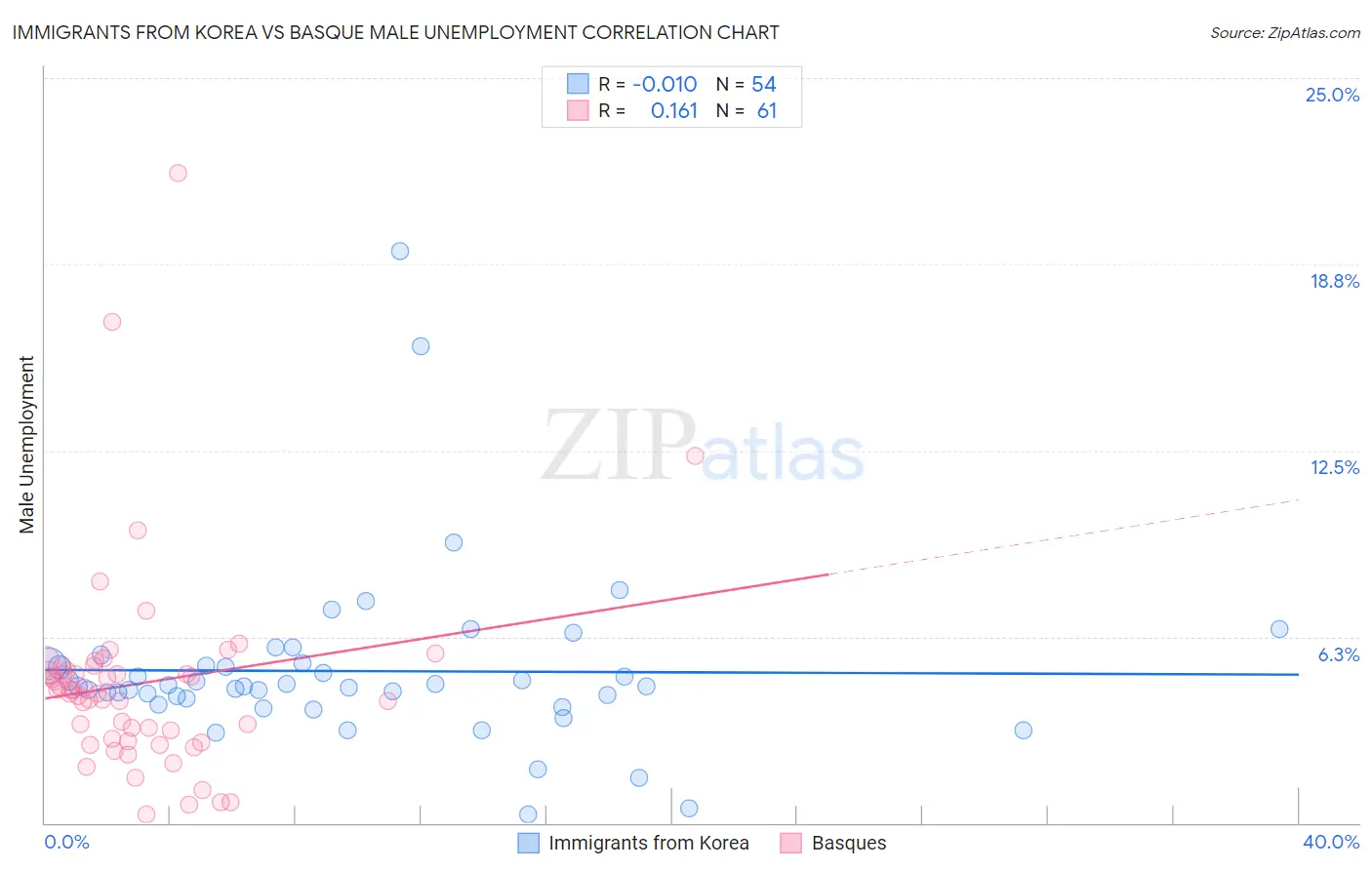Immigrants from Korea vs Basque Male Unemployment
COMPARE
Immigrants from Korea
Basque
Male Unemployment
Male Unemployment Comparison
Immigrants from Korea
Basques
4.9%
MALE UNEMPLOYMENT
99.1/ 100
METRIC RATING
44th/ 347
METRIC RANK
5.0%
MALE UNEMPLOYMENT
97.9/ 100
METRIC RATING
62nd/ 347
METRIC RANK
Immigrants from Korea vs Basque Male Unemployment Correlation Chart
The statistical analysis conducted on geographies consisting of 414,464,791 people shows no correlation between the proportion of Immigrants from Korea and unemployment rate among males in the United States with a correlation coefficient (R) of -0.010 and weighted average of 4.9%. Similarly, the statistical analysis conducted on geographies consisting of 165,517,364 people shows a poor positive correlation between the proportion of Basques and unemployment rate among males in the United States with a correlation coefficient (R) of 0.161 and weighted average of 5.0%, a difference of 1.3%.

Male Unemployment Correlation Summary
| Measurement | Immigrants from Korea | Basque |
| Minimum | 0.30% | 0.30% |
| Maximum | 19.2% | 21.8% |
| Range | 18.9% | 21.5% |
| Mean | 5.1% | 4.7% |
| Median | 4.6% | 4.4% |
| Interquartile 25% (IQ1) | 4.2% | 2.8% |
| Interquartile 75% (IQ3) | 5.3% | 5.2% |
| Interquartile Range (IQR) | 1.1% | 2.4% |
| Standard Deviation (Sample) | 3.0% | 3.4% |
| Standard Deviation (Population) | 2.9% | 3.4% |
Demographics Similar to Immigrants from Korea and Basques by Male Unemployment
In terms of male unemployment, the demographic groups most similar to Immigrants from Korea are Immigrants from Zimbabwe (4.9%, a difference of 0.15%), Immigrants from Japan (4.9%, a difference of 0.18%), Bhutanese (4.9%, a difference of 0.24%), Austrian (4.9%, a difference of 0.31%), and Immigrants from Scotland (4.9%, a difference of 0.32%). Similarly, the demographic groups most similar to Basques are Eastern European (5.0%, a difference of 0.010%), Cambodian (5.0%, a difference of 0.13%), Immigrants from Argentina (5.0%, a difference of 0.20%), Immigrants from Netherlands (5.0%, a difference of 0.39%), and Turkish (5.0%, a difference of 0.53%).
| Demographics | Rating | Rank | Male Unemployment |
| Immigrants | Japan | 99.2 /100 | #43 | Exceptional 4.9% |
| Immigrants | Korea | 99.1 /100 | #44 | Exceptional 4.9% |
| Immigrants | Zimbabwe | 99.0 /100 | #45 | Exceptional 4.9% |
| Bhutanese | 98.9 /100 | #46 | Exceptional 4.9% |
| Austrians | 98.9 /100 | #47 | Exceptional 4.9% |
| Immigrants | Scotland | 98.9 /100 | #48 | Exceptional 4.9% |
| Poles | 98.9 /100 | #49 | Exceptional 4.9% |
| Croatians | 98.9 /100 | #50 | Exceptional 4.9% |
| Slovenes | 98.8 /100 | #51 | Exceptional 5.0% |
| Irish | 98.8 /100 | #52 | Exceptional 5.0% |
| Jordanians | 98.8 /100 | #53 | Exceptional 5.0% |
| Yugoslavians | 98.7 /100 | #54 | Exceptional 5.0% |
| Czechoslovakians | 98.7 /100 | #55 | Exceptional 5.0% |
| Immigrants | Bulgaria | 98.7 /100 | #56 | Exceptional 5.0% |
| Turks | 98.5 /100 | #57 | Exceptional 5.0% |
| Lithuanians | 98.5 /100 | #58 | Exceptional 5.0% |
| Immigrants | Netherlands | 98.3 /100 | #59 | Exceptional 5.0% |
| Immigrants | Argentina | 98.1 /100 | #60 | Exceptional 5.0% |
| Cambodians | 98.1 /100 | #61 | Exceptional 5.0% |
| Basques | 97.9 /100 | #62 | Exceptional 5.0% |
| Eastern Europeans | 97.9 /100 | #63 | Exceptional 5.0% |